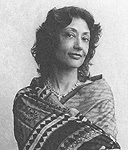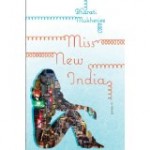
Fiction (Short stories)
Darkness
Markham, Ont.: Penguin, 1985.
PS8576 .U45 D3 1985
Publisher’s Synopsis
Darkness is a powerful collection of stories exploring the complicated tensions of the immigrant experience– all the “small trade-offs between new-world reasonableness and old-world beliefs.”
Fiction
Desirable Daughters: A Novel
Toronto: HarperFlamingoCanada, 2002.
Toronto: HarperPerennialCanada, 2003.
PS8576 .U45 D48 2003
Publisher’s Synopsis (HarperPerennial)
Padma, Parvati, and Tara are three Calcutta-born sisters–intelligent, artistic and extremely independent. Born into a wealthy Brahmin family presided over by their doting father and his traditionalist mother, the girls feel trapped by a society with little regard for young women. Rebelling against the family and convention, the girls’ heads and hearts take them in very different directions.
Fiction
The Holder of the World
Toronto: HarperCollins, 1993.
PS8576 .U45 H65 1993
Publisher’s Synopsis
… Mukherjee creates a vivid, complex tale about the dislocation and transformation that arise in the face of a meeting of cultures: the terrain she has so brilliantly made her own in her acclaimed novels and stories. Here, in The Holder of the World, we witness an unlikely and intriguing meeting of two worlds, the Puritan American and the Mughal Indian. In a startling commingling of history and imagination, Mukherjee lights up the making and very nature of the North American consciousness.
Fiction
Jasmine
Markham, Ont.: Viking, 1989.
PS8576 .U45 J3 1989
Publisher’s Synopsis
When Jasmine Vijh, a young woman in a small Indian town, is widowed by a terrorist bomb, her fate appears to be a life of isolation and despair. In an attempt to escape the confines of home and to reinvent herself, Jasmine flees to America.
In the United States she fashions not one new life, but a series of startling transformations — from illegal immigrant in Florida, to member of a modern Manhattan household, to mother and wife in the heart of Iowa farmland. …
Awards and Honours
New York Times Notable Book of the Year
Fiction
Leave it to Me
Toronto: HarperCollins, 1997.
PS8576 .U45 L42 1997
Publisher’s Synopsis
Debby DiMartino: saved from death in infancy by Gray Nuns at an Indian desert outpost; adopted as a toddler by Manfred and Serena DiMartino of Schenectady, New York; coming of age an inherently exotic girl in an inherently American town, never sure if she was someone special or just a special kind of misfit. Now, at twenty-three, she’s decided that it’s time to find out: time to track down her biological parents. …
Fiction (Short stories)
The Middleman and Other Stories
Markham, Ont.: Penguin, 1989, c1988.
PS8576 .U45 M53 1989
Publisher’s Synopsis
This award-winning collection of stories captures moments in a world of change: The Middleman draws us into the centre of a cultural fusion glowing with the energy and exuberance of a society remaking itself. Passionate, comic, violent and ultimately tender, these stories portray recent immigrants in all their richness and variety, reflected in American eyes equally varied with fear, love, suspicion or pure astonishment. …
Awards and Honours
1989 American National Book Critics Circle Award (Winner)
Fiction
Miss New India
Toronto: HarperCollins, 2011.
PS8576 .U45 M57 2011
Publisher’s Synopsis
Anjali Bose is “Miss New India.” Born into a traditional lower-middle-class family and living in a backwater town with an arranged marriage on the horizon, Anjali’s prospects don’t look great. But her ambition and fluency in language do not go unnoticed by her expat teacher, Peter Champion. …
… And it is in this high-tech city [Bangalore] where Anjali — suddenly free from the traditional confines of class, caste, gender, and more — is able to confront her past and reinvent herself. Of course, the seductive pull of modernity does not come without a dark side…
Fiction
The Tiger’s Daughter
Boston: Houghton Mifflin, 1971.
PS8576 .U45 T5 1971
Publisher’s Synopsis
When Tara Banerjee Cartwright, the heroine of this elegant first novel, returns to her native Calcutta for a summer, she finds she must not only become an intermediary between two cultures but also bear witness to the downfall of her own [Brahmin] class.

Fiction
The Tree Bride
Toronto: HarperCollinsCanada, 2004.
Publisher’s Synopsis (from its website)
In The Tree Bride, the narrator, Tara Chatterjee (whom readers will remember from Desirable Daughters), picks up the story of an East Bengali ancestor. According to legend, at the age of five Tara Lata married a tree and eventually emerged as a nationalist freedom fighter. In piecing together her ancestor’s transformation—from a docile Bengali Brahmin girl-child into an impassioned organizer of resistance against the British Raj—Tara Chatterjee discovers and lays claim to unacknowledged elements in her “American” identity. Although the story of the Tree Bride is central, the drama surrounding the narrator, a divorced woman trying to reunite with her husband, moves the novel back and forth through time and across continents.
Fiction
Wife
Markham, Ont.: Penguin, 1987.
Publisher’s Synopsis
Anthology (Portrait)
“Bharati Mukhrtjee, Montreal 1976.” In Tata, Sam. A Certain Identity: 50 Portraits by Sam Tata. Ottawa: Deneau, 1983, 50.
Anthology (Portrait)
“Bharati Mukhrtjee.” In Tata, Sam. Portraits of Canadian Writers, edited by John Metcalf. Erin, Ont.: Porcupine’s Quill, 1991, 42-[43].
Special Collections TR681 .A85 T3 1991
Selected Criticism and Interpretation
Almeida, Rochelle. “Representations of South Asian femininity: evolutions in Bharati Mukherjee.” In The Expatriate Indian Writing in English. Vol. 1, ed. T. Vinoda and P. Shailaja, 2006, 75-89.
PR9489.6 .E96 2006 v.1
Babcock, Rebecca. ““One Small Way”: Racism, Redress, and Reconciliation in Canadian Women’s Fiction,1980-2000.” Ph.D. diss., Dalhousie University, 2011. Accessed August 30, 2013.
Available as an open access dissertation from http://hdl.handle.net/10222/14198
Barbosa, Cleusa Salvina Ramos Maurício. “Cultural Identities of Diáspora: Myth and Empowerment in Desirable daughters and The tree bride, by Bharati Mukherjee.” Masters thesis, Universidade Federal de Alagoas, 2011. Accessed January 17, 2020.
Available as an open access thesis from http://www.repositorio.ufal.br/handle/riufal/551
Bhakt, N.S. “Bharati Mukherjee.” In New Horizons in Indian English Fiction. Delhi: Swastik Publications, 2010, 58-66.
PR9492.2 .B43 2010
Goldstein-Shirley, David. “Home(s), Family(ies), and Identity(ies) in Mukherjee’s Jasmine .” In Ideas of Home: Literature of Asian Migration. East Lansing: Michigan State University Press, 1997, 249-256.
PS153 .A84 I34 1997
Jeyashree, R. Beulah. “Bharati Mukherjee’s The Desirable Daughters – An Amalgamation of Hyphenation and Assimilation.” In (Ad)dressing the Words of ‘the Other’: Studies in Canadian Women’s Writing, ed. D. Parameswari. Chennai, India: Emerald Publishers, 2008, 129-138.
PS8089.5 .A33 2008
Kandiuk, Mary. “Bharati Mukherjee.” In Caribbean and South Asian Writers in Canada: A Bibliography of Their Works and of English-language Criticism. Lanham: Scarecrow Press, 2007, 98-128.
PS8089.5 .C37 K36 2007
Lazure, Erica Plouffe. “Transcending America: Identity and Bharati Mukherjee’s ‘Global’ Literature.” In The Expatriate Indian Writing in English. Vol. 1, ed. T. Vinoda and P. Shailaja, 2006, 90-99.
PR9489.6 .E96 2006 v.1
Lo, Meng Yu Marie. “Fields of Recognition: Reading Asian Canadian Literature in Asian America.” Ph.D. diss., University of California, Berkeley, 2001.
Available from Proquest Dissertations and Theses
Menon, Sindhu. “And Then Again, Why Not? Subaltern Voices in Bharati Mukherjee’s The Holder of the World.” In The Expatriate Indian Writing in English. Vol. 2, ed. T. Vinoda and P. Shailaja, 2006, 142-152.
PR9489.6 .E96 2006 v.2
Mukherjee, Bharati. Conversations with Bharati Mukherjee, ed. by Bradley C. Edwards. Jackson: University Press of Mississippi, 2009.
PS8576 .U45 Z46 2009
Nayak, Bhagabat. “Quest for Identity in Bharati Mukherjee’s Desirable Daughters.” In Postcolonial Indian English Fiction: Critical Understanding, ed. N.D.R. Chandra. New Delhi: Adhyayan Publishers, 2010, 123-139.
PR9492.52 .P67 2010
Nayaki, M.Thayyal. “Mongrelization as an Immigrant Experience in Bharati Mukherjee.” In (Ad)dressing the Words of ‘the Other’: Studies in Canadian Women’s Writing, ed. D. Parameswari. Chennai, India: Emerald Publishers, 2008, 116-128.
PS8089.5 .A33 2008
Newman, Judie. “Bharati Mukherjee.” In A Companion to Twentieth-Century United States Fiction, ed. David Seed, [539]-546. Chichester, UK: Wiley-Blackwell, 2010.
PS379 .C635 2010
Noon, Mary Joy. “Beyond Breaking the Silence: Race, Gender, and Survivor Subjectivities in Feminist Rape Narratives by Contemporary American Women of Color.” M.A. thesis, Texas Christian University, 2009. Accessed August 31, 2013.
Formerly available as an open access thesis.
Parmar, Virender. Home Elsewhere: A Study of Short Fiction of Jhumpa Lahiri and Bharati Mukherjee. Jalandhar, India: ABS Publications, 2006.
PS153 .M56 P37 2006
Patel, M.F. and Dinesh B. Chaudhary. “Bharati Mukherjee: A Post Modern Indian Woman Novelist.” In Critical Studies on Indian English Literature. Vol. 2, ed. M.F. Patel. Jaipur: Pointer Publishers, 2010, 123-127.
PR9484.6 .C75 2010 v.2
Queiroz, Helenice Nolasco. “Desirable Relations: Diaspora and Gender Relations in Bharati Mukherjee’s Jasmine and Desirable Daughters.” Masters thesis, Universidade Federal de Minas Gerais, 2011. Accessed August 31, 2013.
Available as an open access thesis from http://hdl.handle.net/1843/ECAP-8G2KW8
Rahman, Shazia. “Resisting Women: Orientalism, Diaspora, and Gender.” Ph.D. diss., University of Alberta, 2002.
Available from Proquest Dissertations and Theses
Rani, G. Sheela Swarupa. “Resilient Victims and Resilient Heroes: A Reading of Bharati Mukherjee’s Jasmine.” In The Expatriate Indian Writing in English. Vol. 2, ed. T. Vinoda and P. Shailaja, 2006, 249-257.
PR9489.6 .E96 2006 v.2
Ruia, Reshma. “A Mouthful of Silence and the Place of Nostalgia in Diaspora Writing: Home and Belonging in the Short Fiction of Bharati Mukherjee and Jhumpa Lahiri.” Ph.D. diss., University of Manchester, 2012. Accessed August 31, 2013.
Available as an open access dissertation from http://www.manchester.ac.uk/escholar/uk-ac-man-scw:159410
Singh, A.K. “Re-Routing Self: Diasporic Experience in The Tiger’s Daughter by Bharati Mukherjee.” In The Indian Diasporic Writing (Theory and Discourse), ed. Satyavir S. Phulia and Hemant Verma. New Delhi: Shri Sai Printographers, 2009, 125-137.
PR9485.45 .I53 2009
Singh, Jaspal Kaur. “Bharati Mukherjee.” In Asian American Novelists: A Bio-Bibliographical Critical Sourcebook, ed. Emmanuel S. Nelson, [240]-250. Westport, Conn.: Greenwood Press, 2000.
PS153 .A84 A825 2000
Singh, Jaspal Kaur. “The Indian Diaspora and Cultural Alienation in Bharati Mukherjee’s Texts.” In her Representation and Resistance: South Asian and African Women’s Texts at Home and in the Diaspora. Calgary: University of Calgary Press, 2008, 61-88.
PN56.5 .W64 S563 2008
Singh, Kanchan. “The Theme of Transformation in Bharati Mukherjee’s Jasmine.” In Perspectives on Indian Writing in English, ed. R.A. Singh and Anjani Kumar Singh, [129]-132. Jaipur, India: Book Enclave, 2007.
PS9480.1 .P47 2007
Stening-Riding, Marie-Louise. “How Newness Enters the World: Hybridity in the Intercultural Novels of Bharati Mukherjee, Michael Ondaatje and Salman Rushdie”. Ph.D. Diss., Dalhousie University, 2004.
Available from Proquest Dissertations and Theses
Thankappan, Hemant, and Raghvendra Naidu. “Bharati Mukherjee’s Treatment of Identity Crisis.” In Indian Diasporic Literature: Text, Context and Interpretation, ed. Shalini Dube, 63-67. New Delhi: Shree Publishers, 2009.
PK5416 .I53 2009
Weagel, Deborah. “The Metaphor of the Quilt in Contemporary Asian Indian and American Indian Literature.” Ph.D. diss., The University of New Mexico, 2006.
Available from Proquest Dissertations and Theses
Zaman, Niaz. “Old Passions in a New Land: A Critique of Bharati Mukherjee’s “The Management of Grief” and Bapsi Sidhwa’s “Defend Yourself Against Me”.” In Ideas of Home: Literature of Asian Migration. East Lansing: Michigan State University Press, 1997, 75-85.
PS153 .A84 I34 1997
Links
Publisher HarperCollinsCanada
Bharati Mukherjee page at Internet Public Library: Literary Criticism
Mukherjee page by Erin Soderberg at VG: Voices from the Gaps: Women Writers of Color




